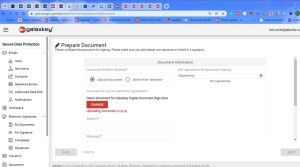Since March this year, UK organisations and enterprises have faced increasing challenges, and have been required to master them quickly in order to keep operating during the coronavirus outbreak. From ramped up cyber threats from targeted spear phishing operators, to government-enforced safety restrictions that have seen offices left empty, companies have been required to adapt quickly.
Digital transformation and a dependency on technology has become crucial to the continuation of business processes, allowing employees to perform their roles remotely while delivering the same level of service without disruption or delay to clients. Communication and the exchanges of information, whether it be via email or digital file, is an integral part of most organisations’ essential workflow. From legal documents and employee timesheets, to payslips and contracts, a wealth of data must be moved, both swiftly and securely. To answer these two prime concerns, using a digital signature can be an advantageous option worth considering.
What is a digital signature?
An electronic or digital signature, also commonly called an “e-signature”, refers to information in electronic format, linked with data also in electronic format, which is employed by a person to sign. This can cover a wide range of actions from a script-style signature scanned in, or created with an e-signature platform, to more basic examples such as digital tick box.
Both efficient for enterprises to employ in term of time and money, using digital sign features can also improve and streamline business processes. Documents be signed in a matter of seconds, conveniently from any location across the world, and this comes with the bonus of enabling offices to take a greener approach and become paperless.
Although more traditional signatures made using wet ink are required by a few institutions such as Her Majesty’s Revenue and Customs (HMRC), digital signatures have been confirmed as admissible in UK courts by the Law Commission, who have stated they are a valid and acceptable way for deeds to be executed.
Employing e-signatures during the COVID-19 crisis
The capacity to sign documents digitally has proved useful to companies during the pandemic, with many employees continuing to work remotely. Finding it a highly productive way of working, many large enterprises such as German manufacturing giant Siemens aim to continue to give staff the option for flexible working even after the crisis passes. Digital document signing has afforded businesses a way for their personnel to stay safely social distanced while maintaining data flow securely.
Here at Galaxkey, we have developed a comprehensive security platform complete with a state-of-the-art digital sign solution. Our e-signature options allow staff and clients to complete documents quickly while always verifying senders and enabling them to track data in transit. From confidential contracts, to spreadsheets containing personally identifiable information (PII), all data exchanged can also be secured using robust three-layer encryption that renders it indecipherable to those without authorisation. Get in touch with our specialist team today to discuss digital document signing and test drive our platform with a free 14-day trial.



